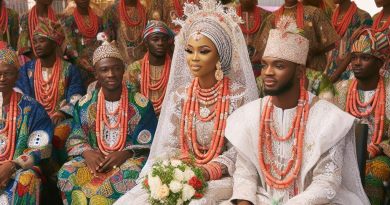Marriage Registry vs. Church Wedding: What’s Legal?
Last Updated on January 28, 2024
Introduction
The topic of marriage in Nigeria
Marriage Registry vs Church Wedding: Marriage in Nigeria holds cultural and religious significance, involving both the marriage registry and church weddings.
Significance of the marriage registry and church wedding
The marriage registry and church weddings play important roles in the legal and ceremonial aspects of marriage.
Purpose of the blog post
The purpose of this blog post is to explore the legality of marriage through the marriage registry and church weddings in Nigeria.
Explanation of Marriage Registry
Definition the Marriage Registry and its legal Importance
The marriage registry is a government establishment responsible for recognizing and recording marriages.
It holds legal significance as it offers couples a legally recognized union, granting them numerous benefits and protections.
Process of registering a marriage in Nigeria
In Nigeria, couples seeking to register their marriage at a registry need to follow a specific process. First, they must schedule an appointment with the chosen registry.
This ensures a specific date and time for their marriage to be legally recognized. On the chosen day, couples need to appear in person with all the necessary documents.
Legal requirements and documents needed for the registry
When registering a marriage in Nigeria, several legal requirements and documents must be fulfilled. Both partners need to provide valid proof of identification, such as passports or national identity cards.
Additionally, birth certificates or age declarations may be required to verify the couple’s age eligibility for marriage. Furthermore, couples may need to present photographs for documentation.
Benefits of a marriage registry
The existence of a marriage registry offers numerous benefits to couples.
- Firstly, it provides legal recognition and protection for the spouses involved. This recognition ensures that couples have the legal rights and responsibilities that come with marriage.
- It includes property rights, inheritance rights, and the ability to make decisions on behalf of their partner in certain situations.
- Secondly, a marriage registry grants access to certain benefits, both governmental and non-governmental ones.
- For example, government benefits may include tax advantages or eligibility for social security and health insurance.
- Non-governmental benefits may involve spousal employment benefits or access to joint bank accounts. These benefits help couples build a stable and secure future together.
Basically, the marriage registry holds great importance as it legally recognizes and records marriages.
Understanding the process, requirements, and benefits of the registry allows couples to make informed decisions and secure their rights and privileges as legally married partners.
Read: The Cultural Significance of Marriage in Nigeria
Overview of Church Weddings
The concept of a church wedding in Nigeria
- In Nigeria, a church wedding is a religious ceremony conducted in a church, where a couple seeks the blessings of God on their union in the presence of family and friends.
- It is an important event in the life of a couple and holds deep cultural significance.
Religious and cultural significance of church weddings
- Church weddings in Nigeria are often seen as sacred and blessed by God, making the marriage union stronger.
- They are rooted in religious beliefs and values, reflecting the couple’s faith and commitment to their chosen religious denomination.
- Additionally, they serve as a platform for family and friends to witness and celebrate the union, showcasing the couple’s cultural traditions.
Differences between a church wedding and a marriage registry
1. Ceremonial Differences
A church wedding involves a religious ceremony conducted by a minister or priest, while a marriage registry is a civil and legal process conducted by a registrar.
2. Religious Customs
Church weddings incorporate various religious customs, such as exchanging vows, receiving blessings, and performing religious rituals, depending on the denomination.
Meanwhile, marriage registry ceremonies are secular and lack religious elements.
3. Venue
Church weddings occur in holy places of worship, while marriage registry ceremonies are held in the registrar’s office or a designated registry.
4. Guest List
Church weddings often have a larger guest list, including family members, friends, and members of the religious community.
Conversely, marriage registry ceremonies usually have a limited number of attendees, with only close family and friends present.
5. Cost
Church weddings tend to be more expensive due to the costs associated with booking the church, hiring religious officials, and organizing religious rituals.
Marriage registry ceremonies are generally more affordable, as they involve minimal expenses.
6. Symbolism
Church weddings symbolize the couple’s commitment to each other in the eyes of God and the religious community. Marriage registry ceremonies are legally recognized, but they lack the same religious symbolism.
7. Cultural Significance
Church weddings often incorporate cultural customs, such as traditional attire, music, and dances, reflecting the couple’s cultural heritage.
Marriage registry ceremonies, being secular, may not showcase cultural traditions in the same way.
Generally, a church wedding in Nigeria is a religious ceremony that holds deep cultural significance and serves as a platform for couples to seek God’s blessings on their union.
It differs from a marriage registry ceremony in terms of ceremonial practices, religious customs, venue, guest list, cost, symbolism, and cultural significance.
While both options are legal, couples often choose between them based on their beliefs, values, and personal preferences.
Read: Modern Nigerian Couples: Changing Face of Vows
Legal Implications
Legality of Church Weddings in Nigeria
- The government legally binds and recognizes church weddings in Nigeria.
- The Marriage Act of 1990 outlines the legal requirements and obligations for church weddings.
Legal Obligations and Requirements for Church Weddings
- Both the bride and groom must be of legal age, which is 21 years and above, to enter into a church marriage.
- Both parties must provide evidence of their consent to marry, usually through signed marriage declaration forms.
- The couple must give notice of their intention to marry to the church where they plan to have the wedding.
- Some cases require a 21-day waiting period between notice of intent to marry and the wedding date.
- The couple must complete pre-marital counseling or attend marriage classes as a legal requirement.
- The church may request proof of baptism or membership for at least one of the parties.
- Witnesses, usually two adults, must be present during the wedding ceremony to attest to the marriage.
- The church wedding ceremony must be conducted by a recognized and registered clergy member.
- The marriage ceremony should follow the prescribed religious rites and rituals of the church.
Legal Documents Needed for a Church Wedding
- Before a church wedding, a couple must obtain a valid marriage license from the marriage registry for the solemnization.
- The couple will need to present their birth certificates or other acceptable forms of identification.
- Both parties must provide evidence of their single status, such as an affidavit of bachelorhood or spinsterhood.
- You must present any applicable previous marriage certificates, divorce decrees, or death certificates of former spouses.
- The marriage declaration forms must be completed and signed by both the bride and groom.
- In some cases, the church may require the couple to obtain a letter of consent from their parents or guardians.
- The couple may need to provide two passport-sized photographs each for documentation purposes.
Having a church wedding in Nigeria not only carries religious significance but also legal implications.
It is important for couples to understand and comply with the legal obligations and requirements to ensure the validity of their marriage.
Read: A Guide: Writing Your Vows for a Nigerian Wedding

Discover More: Nigerian Celebrities and Their Most Memorable Wedding Toasts
Differences in Recognition
Legal recognition of marriage registered at the registry
Registering a marriage at the registry legally recognizes and validates it under the law.
Level of recognition for church weddings in the legal system
The legal system recognizes church weddings, but they come with limitations and specific requirements.
Limitations or challenges faced by church weddings in terms of legal recognition
To achieve full recognition, couples having church weddings might have to meet extra legal prerequisites.
Read: The Influence of Religion on Marriage Life in Nigeria
Pros and Cons
Advantages and Disadvantages of a Marriage Registry
1. Advantages
- Convenience: Couples can easily obtain their marriage license without any religious affiliation.
- Cost-effective: The fees for a marriage registry are typically lower compared to a church wedding.
- Flexibility: Couples can choose any location to hold their ceremony, such as a beach or park.
- Simplicity: The process involves filling out paperwork and signing the legal documents.
2. Disadvantages
- Lack of tradition: Some couples may feel that a marriage registry lacks the ceremonial and symbolic aspects of a church wedding.
- Limited customization: There may be restrictions on personalizing the ceremony, as it is more focused on legality rather than individual preferences.
- Absence of religious rituals: Couples who desire religious rituals and blessings may find a marriage registry lacking in that aspect.
Pros and Cons of a Church Wedding
1. Pros
- Spiritual significance: Church weddings hold deep religious meaning and allow couples to proclaim their love in the presence of God.
- Tradition and symbolism: Church weddings often include rituals and customs that bring a sense of tradition and symbolism to the ceremony.
- Community support: Church weddings provide a sense of community support through the presence of family, friends, and fellow believers.
- Emotional connection: Many couples find emotional resonance in exchanging vows within the sacred walls of a church.
2. Cons
- Religious requirements: Church weddings necessitate adherence to specific religious beliefs and may require pre-marital counseling or classes.
- Cost implications: Church weddings can be more expensive due to additional fees for using the church facilities and involving clergy.
- Limited venue options: Couples may have to settle for a specific church location and may face restrictions on personalizing the ceremony.
Encouraging Readers to Consider Personal Preferences and Legal Implications
Choosing between a marriage registry and a church wedding is a deeply personal decision that should consider both personal preferences and legal implications. Here are some factors for readers to ponder:
1. Personal Preferences
- Reflect on religious beliefs and the desire for a spiritual or traditional ceremony.
- Consider the significance of religious rituals and customs within the wedding ceremony.
- Evaluate the importance of community support and the presence of loved ones in the celebration.
2. Legal Implications
- Understand the legal requirements and implications of a marriage registry in your jurisdiction.
- Familiarize yourself with the documentation needed and any legal obligations involved.
- Seek guidance from legal professionals if necessary to ensure compliance with local laws.
In summary, choosing between a marriage registry and a church wedding entails weighing the advantages and disadvantages associated with each option.
Couples should carefully evaluate their personal preferences, legal implications, and the significance they attach to religious or traditional elements before making a decision.
Ultimately, the choice should be a reflection of the couple’s desires, values, and vision for their special day.
Conclusion
Summary of the main points discussed
In summary, the main points discussed in this blog section focused on the legal aspects of marriage registry and church weddings in Nigeria.
Concluding statement on the legal aspects of marriage registry and church weddings in Nigeria
Both Nigeria legally recognizes marriage registry and church weddings, but they vary in requirements and procedures.
Encourage readers to seek legal advice and make informed decisions regarding their marriage celebration
Lastly, it is highly advised that readers seek legal advice and make informed decisions when planning their marriage celebration. Understanding the legal aspects will help ensure a smooth and legally binding union.


